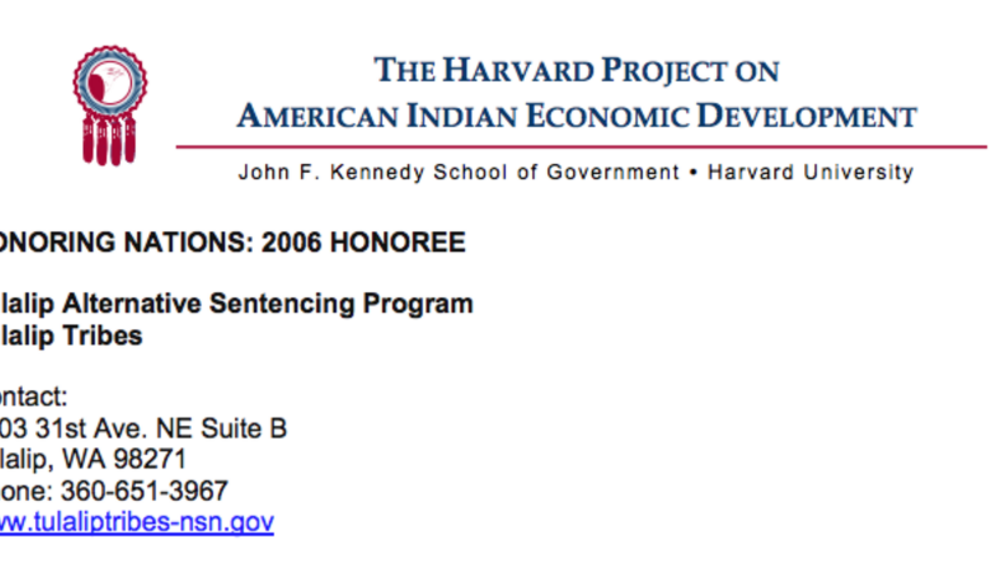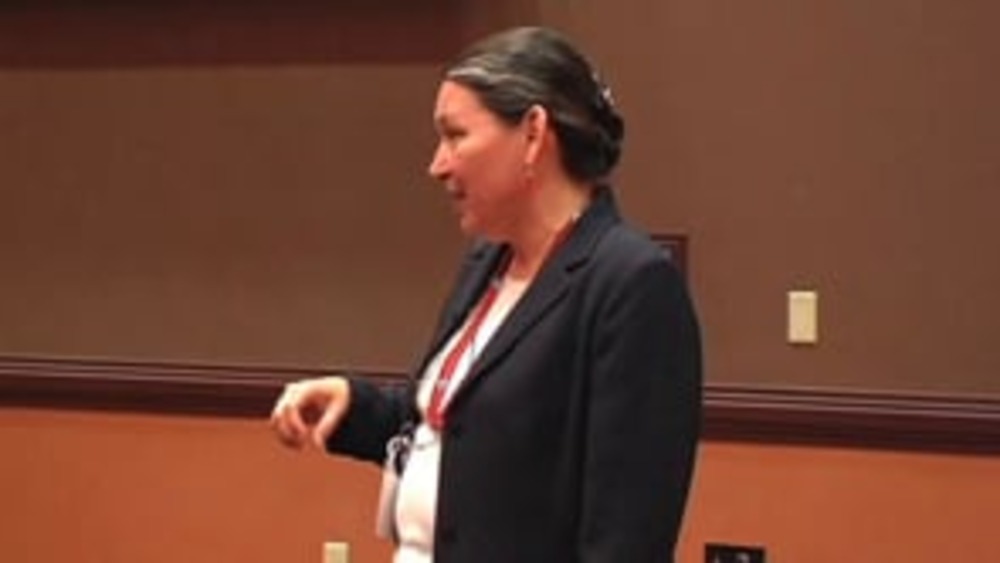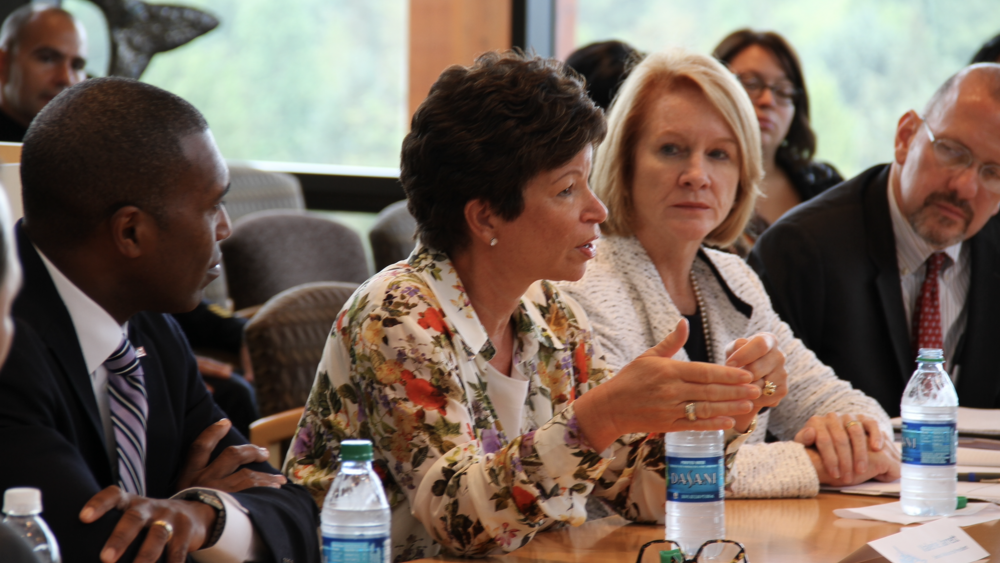Judge Theresa M. Pouley of the Tulalip Tribal Court discusses how the Tulalip Tribes reclaimed criminal jurisdiction from the State of Washington and then developed the award-winning Tulalip Alternative Sentencing Program, which she explains is a more effective and culturally appropriate approach to the administration of justice for Tulalip citizens.
Additional Information
Pouley, Theresa M. "The Tulalip Alternative Sentencing Program." Honoring Nations symposium. Harvard Project on American Indian Economic Development, John F. Kennedy School of Government, Harvard University. Cambridge, Massachusetts. September 27-28, 2007. Presentation.
Transcript
Duane Champagne:
"Our first speaker will be -- well, it was supposed to be Gary Bass, who is the head judge at Tulalip and he is one of the founders and sustainers of the Alternative Sentencing Program. But in his place, he's sent us Theresa Pouley, who is associate judge and who actually made the presentation at the Honoring Nations final program. They're 2006 honorees and have a very outstanding program, which I'll let Theresa tell you about."
Theresa M. Pouley:
"Well, I want you to know first that Judge Bass really wanted to be here and he is here in spirit, but he's also here in form. If you look at the 2008 applications [brochure], his picture's right here, standing next to me. And I thought a little bit -- except justices and judges are supposed to be more serious -- that I'd wear it as a little mask today so it was really Gary Bass, but then I changed my mind. I'm Theresa Pouley. I'm the associate judge. As chief judges often do, he delegated this responsibility to me to talk to you about Tulalip's Alternative Sentencing Program. And I was actually delighted. When I talked to Amy [Besaw Medford] and she called me on the phone, she said, 'Oh, this is going to be the feel good section,' and I was like so excited [because] nobody says 'feel good' and 'tribal court' in the same sentence ever. So what I'm going to do is just remind you that when I start out, it's not going to feel very good, but when I get to the end, just like Amy's been for this whole conference -- she's totally right, it is going to work.
I always start, when I do presentations like this, by thinking about words from our ancestors, from different tribes. And in this particular case, I thought about this saying from a Shenandoah proverb that says, 'It's no longer enough to cry peace. We have to act peace, live peace and live in peace.' And Tulalip's Alternative Sentencing Program is really geared towards doing those things. How do you act peace?
You look a little bit at the history of the Tulalip tribes -- and this is not the feel good part of my presentation -- crime on the Tulalip Indian Reservation, which is located in western Washington, traditional fishing tribe, about 3,500 tribal members now -- the reservation by the time the 1980s and 90s came around was characterized by everybody who knew it as lawless. That's a pretty serious, and makes you take a serious sigh, about how the criminal justice system is operating at Tulalip. Now why is that? It's exactly the same as it is all over Indian Country -- the federal government took over traditional Native problem-solving and replaced it with a system of punishment and prison, and not a surprise, it didn't work at Tulalip. The main road that goes through the Tulalip Reservation was designated by the Washington State Patrol and virtually every other agency as 'blood alley' because of the number of drug- and alcohol-related deaths on its highways. In 2001, the Tulalip Board of Directors said, 'Enough is enough. We're tired of having state law enforcement on the reservation, we're tired of sending tribal members to state court, we're tired of having this reputation of lawlessness on the reservation, and we're going to take our community back. We are going to solve the criminal problems that happen within the boundaries of the Tulalip Reservation.' And they did.
They got a State [of Washington] piece of legislation, which retroceded all of their criminal jurisdiction under Public Law 280, and they took over and went about the business of adjudicating its own tribal members as guilty of crimes and holding them accountable for those crimes. Now, 2001, you had a huge influx of cases. So Tulalip Tribes never has heard a criminal case, never had a criminal defendant come before the bench before, and in a two-year period of time, they had 1,100 criminal cases filed in tribal court. Zero to 1,100. Imagine, if you will.
By 2003, Chief Judge Bass came to one conclusion that should have been easy for any judge to see all along, which is, his clients were all the same clients. And why were they committing crimes? Were they committing crimes because they had criminal behavior? No. They were committing crimes because 95 percent of the time, they had substance abuse issues. Over 60 percent of the time, they had mental health issues. Many of them suffered from post-traumatic stress disorder because they were removed from their family's homes, because they were sent to boarding school. The issues that were bringing those clients to court simply were not being resolved, not on any day. So Judge Bass decided, in a Nike© kind of way, 'Just do it.' We can do it better than that.
So he created a special criminal calendar where he had clients come into court on a weekly basis and he asked them the question. 'I asked you to get a drug and alcohol evaluation. Did you get one?' And if they didn't, then he'd say, 'You're going to get one by next week and if you don't, I'll throw you in jail.' Throw you in jail for a long time like they would in the state court system? Warehouse you off 365 days? No. One day, to make the point. That's how important it was that you should get a drug and alcohol evaluation. Combined with that -- you know, modern technology is a wonderful thing. He used a system of urinalysis testing. It's a big joke at Tulalip, by the way. If you come in to get a will at Tulalip, you better be prepared to take a UA. You want a divorce, we're going to hand you the cup. Because, here's the key, early identification of drug and alcohol related issues and constant monitoring of sobriety is critical to your ability to comply with court orders. If the judge tells you that you have to get community service, that you need to get a job, you need to get a GED, what is the chance of you being able to accomplish that objective if you're addicted to drugs or alcohol? All of the state statistics will tell you exactly what the chances are: seven in 10 Native Americans in jail today are there because they did not comply with their probation. Why not? Because they're addicted to substances.
So a concerted effort was made by Judge Bass to change the way business got done. It was so successful on individual clients that the police were seeing, that the Chief of Police of the Tulalip Tribes went to the Board of Directors and said, 'I think you should pass a resolution. That resolution should require that we all investigate alternative sentencing and that we have a drug court.' And they passed a resolution implementing those things. So that's the history of how we get there. So now we know how we act peace. So how do we live peace?
We have Tulalip's Alternative Sentencing Program, which incorporates all the best values of the Native culture into a modern and traditional court system. First of all, you have regular and frequent reviews with the judge. And the judge is there not to punish you, the judge is there to encourage you to make better choices. If you do a good job, the judge is going to come off the bench and give you a hug. If you get your GED and graduate, your case is going to be closed. If you get a job when you haven't been employed for the last 20 years of your life, a round of applause is going to break out in the courtroom. That's how alternative sentencing works. We still had a group of clients that we couldn't reach, our repeat offenders who had been in court now five, or six, or seven, or eight times. And that particular system wasn't working. So the question became, what do we do with those clients? And the answer is, change. Change everything. And you start with changing the name. [Salish language]. The court 'giving the means to get stronger' is Tulalip Tribes' wellness court. Wellness court coordinates all of the services of the tribe. They all meet together once a week and those clients come forward and visit not just with the judge, but with all of the institutions of the tribe. Drug and alcohol counselor is there, mental health counselor is there, GED provider is there, Northwest Indian College is there -- everybody who has a vested interest in this person's life and in the requirements for that person sits at the table once a week. But remember, you have to change everything.
So imagine the courtroom. Now the courtroom is an entirely different place. They all sit in a circle. They start the proceedings and they open with a prayer. And everybody sitting around the circle, client, public defender, prosecutor, police officer, treatment provider, we all take our turn giving a prayer. And then all of the clients take turns doing closing prayers. Now Tulalip isn't a homogenous society. We have a variety of religions that are there, but we all get to learn and respect one another. These proceedings which happen in a circle, you don't sit on the bench–which is a problem for me when I do [Salish language], because I'm a little short, so sitting around in the circle sometimes is problematic, so I like to get up and wander around. You all sit in a circle, you open with a prayer, you close with a prayer, and they all watch out for each other.
When we first were awarded Honoring Nations in 2006, we'd just started [Salish language]. Now, we've had our first two graduates. The most rewarding thing, and this is what Amy's right about, is that I have a grandma who is a grandma to her grandchildren again, and a mother to her children again. The most rewarding thing is that I have a young mother who's 25 years old, who has four children who have all been removed from her care. And not only has she been clean and sober for eight months [because] she's got to come visit with the whole team every week, but now she's starting to get her children back. The Tulalip Tribes is planning on moving for an in-home dependency within the next couple of months. And not only that, as if that wasn't enough, her husband has always been a problem child. Since 2001, he was one of our very first criminal cases. And in 2006, he's still racking up charges. And in 2007, he's out of jail and on probation again. And guess what? He also is doing fabulously. The family's in family counseling, there's in-home services. We just gave them a congratulations card because, for the very first time in their life, they have a home with their children in it. You can just change everything and you do it just one at a time.
Now that's sort of the anecdotal information, but I'm always reminded, especially when I come to these gatherings, that it's not really my job. Nor do I get the luxury of seeing the results on a daily basis, but every once in awhile I get that reminder. We don't do this work for the mom, necessarily. We do this work to break the cycle of violence and drug addiction in our community that deprives her children and her grandchildren from being able to be tribal chairwoman. Actually, her children are all girls. So if they wanted to be tribal chairman that would be okay, too.
So if you act peace, live peace, how do you live in peace? You have to figure out how to incorporate the custom and tradition and values of the tribe into the justice system. Courts are not popular places. Nobody wants to come to court. I bet all of you when you thought you were going to talk to a judge you're like, 'Oh, man.' And I bet each and every one of you has a relative who's been to court and didn't have anything nice to say about going to court. Remember that separation of powers does not mean separation of solutions, and it certainly doesn't mean separation of problems. The Tulalip Board of Directors passed a resolution that said that we should plan a wellness court, that we should plan alternative sentencing, and the chief judge could have said, 'Absolutely not! You can't say anything about that. Separation of powers.' But he didn't because we have the same problems and we needed the same solutions. The same thing's true for the chief of police. He didn't ask those questions and he wasn't interfering with the province of the court. We need to learn how to work together. We have to quit thinking of our relatives who are in court as sort of the black sheep of our family. We have to love all of our clients and I really hope for every one of my clients everyday -- even when I send them off to jail once or twice -- that they get the message this time. [Because] I never know when I'm going to be looking at the chairman of my tribe, or when I'm looking at the mother of the chairman of the tribe. [Salish language]. That's the judge's role. The court's role is to give people the tools to help them be stronger. But that means everybody here -- this is all of your obligation -- you've got to talk to your local tribal court judge, bring them into the loop. Don't be afraid of passing a resolution. It is absolutely critical to our tribal members that we take the time to figure out how those disadvantaged people in our communities can be made whole, because if we don't, that's just perpetuated into another couple of generations. It's absolutely critical that you use justice systems to change behavior in a positive way. And when you do that, you go back to the more traditional problem solving.
At Tulalip it was like this all the time. From my own family it's absolutely like that. Court becomes a place where there's teaching to be given, not only to the person who's appearing in front of you, but to everyone else in the courtroom and everyone else in the community. Teachings are given. That's how we hand down particular pieces of information for the next generation. So, it's the old Shenandoah proverb right? Tulalip decided 'it's not enough to cry peace' anymore. 'We [absolutely] have to act peace, live peace and live in peace.' Crime rate at Tulalip, a year after this program, has decreased 25 percent -- 25 percent. That's an amazing day. And we get our mothers and our grandmothers back. We get our fathers and our grandfathers back. We do it for the future of our children in the ways of our ancestors. Thank you."



